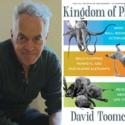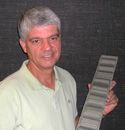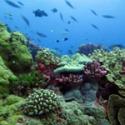Science Is Essential
Science touches so many aspects of modern life that it's hard to keep up. Through our programs and this website, Science for the Public provides up-to-date information about scientific innovations, discoveries, and issues that are shaping modern knowledge.
Coming Events
No events are scheduled for June or July
Recent Events
Space Debris Alert!: The Potential Impact on the Ozone Layer and Earth’s Climate
05/27/25 (rescheduled from April) Thousands of satellites orbit Earth. At the end of their missions, they drop into and burn up in the stratosphere, depositing ash that contains oxides and pollutants that are affecting both the ozone layer and the planet's climate. Atmospheric scientists are working to analyze the aerosols and their worrisome impact. Daniel Cziczo
The Brain-Computer-Interface Paradox
05-20-25 For individuals paralyzed by injury, stroke or ALS, brain-computer-interface (BCI) devices can enable movement and even speech. However, there are concerns: specifically, that such technology could be developed for mind control. Lukas Meier
Cancer Research: How It Works and Why It's Crucial Today
04/08/25 Numerous types of cancer are increasing today and scientists are trying to identify the causes. That's why cancer research is one of the most important concerns of modern science. We learn how the research is done and also why federal funding for this work is essential. Gerald Denis
Resistance to New Ideas
Many of the most important advances in scientific understanding were initially rejected or ignored.
Life: Extreme Forms of Life
The discovery of organisms thriving in extreme temperatures and conditions deep undersea, deep in the Earth, deep in the ice suggests that life, once it emerges, is extraordinarily resilient..
Featured Items
Using Gravitational Lensing to Detect Dark Matter
01/14/25 Dark matter accounts for some 27 percent of the universe but is invisible. One promising technique to reveal it is the analysis of gravitational lensing that very occasionally aligns galaxy clusters. Jacqueline McCleary
Is Earth Exceptional?
02/18/25 Is there life beyond Earth? So far, despite the discovery that there are billions of planets in our galaxy, and our increasingly sophisticated probes for life, we still don’t know. Life and the conditions for its emergence are both very complex phenomena. Mario Livio
Heads Up! Surprising Stats
Science for the Public is committed to improving public knowledge of science and public appreciation for the contributions of science to social progress.

Using Gravitational Lensing to Detect Dark Matter
01/14/25 Dark matter accounts for some 27 percent of the universe but is invisible. One promising technique to reveal it is the analysis of gravitational lensing that very occasionally aligns galaxy clusters. Jacqueline McCleary

They Didn't Believe It! Dark Matter
12/02/19 Most of the matter in the universe is invisible --and scientists still do not know what it is. This is a brief story of how the idea of dark matter was very slowly accepted.

Kingdom of Play
05/06/24 WGBH Forum Network webinar. All sorts of animals engage in imaginative types of play. Is this behavior just creature-entertainment, or is it important for development and bonding? David Toomey

Breakthroughs in Nanotechnology
09/27/16 Advances in nanotechnology are revolutionizing medicine. A leader in the field describes recent developments and his commitment to making them available to a wide public. Sameer Sonkusale

Harvesting Electricity Out of Thin Air
10/24/23 Imagine a future world in which clean electricity is available anywhere you go. The generic Air-gen effect innovation means that this future world can become a reality. Jun Yao
Today's Featured Contributors
Featured Author

Mick Follows, Ph.D.
An interdisciplinary perspective on the biogeochemical relationships of ocean cycles
Featured Guest

Jack Ridge, Ph.D.
A leader in the study of North American glacial varves
As a world society, it seems clear that we have arrived at a point in our history when there must be a major increase in the capability of ordinary people to cope with the scientific and technological culture that is shaping their lives and the lives of their children.
—Leon Lederman, Nobel Laureate in physics




















